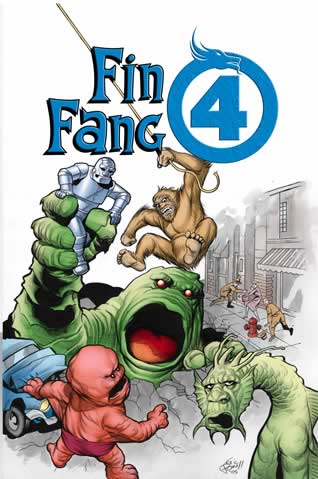 Home > CR Interviews
Home > CR Interviews Special: An Interview With Roger Langridge
posted October 16, 2005
Special: An Interview With Roger Langridge
posted October 16, 2005
 AN INTERVIEW WITH ROGER LANGRIDGE
AN INTERVIEW WITH ROGER LANGRIDGE
BY ANDREW FARAGO

Several years ago my friend Gil suggested that comics could never truly claim to have arrived until Roger Langridge is a big star. People feel that strongly about the cartoonist behind
Hotel Fred,
Knuckles the Malevolent Nun,
Fred the Clown and
Art d'Ecco (with brother Andrew) among others. At one early Small Press Expo I was approached by a pack of artists at a party in the hopes I might know what he looked like and could signal them if he showed up, something that's only happened to me with one other artist (Eddie Campbell) at one other show (a San Diego con). Langridge's work is clean, vibrant, beautiful to look at as a series of cohesive units and possessed of a wonderful, classic-comics take on character design and comedic timing. The cartoonist's struggle to find his deserved audience in several different comics market may be the oddest proof of his comics' timelessness. Hopefully, as his career continues to build from multiple companies and in multiple avenues, more and more readers will make the same discovery a few readers and several fellow pros already have: Roger Langridge is a great and largely undiscovered treasure.
This Wednesday sees the latest chance for folks to discover Roger Langridge in a reasonably high-profile side project: a take on Marvel's monster and the transitional early-superheroes period with Scott Gray called
Fin Fang Four. Next month Langridge will have an 11-page story in a Marvel holiday special teaming with Shaenon Garrity and featuring a plot assist by Andrew Farago, who performed the following interview back in April. In addition to providing this site with the occasional high-quality interview, Farago is the Gallery Manager/Curator of the
Cartoon Art Museum.
GOING TO APE
ANDREW FARAGO: It's April 12, 2005, and I am in my living room with cartoonist Roger Langridge...
ROGER LANGRIDGE: Hello.
FARAGO: This is the Tuesday following the Alternative Press Expo. What were your impressions of the Alternative Press Expo 2005?
LANGRIDGE: I had fun, which is not the most important thing -- covering my costs is the most important thing, which I didn't do -- but it was a good time. [laughs] I'm trying to think of something interesting to say... no, I can't.
FARAGO: I don't know how many American conventions you've done at this point, but did this stand out as being any different than SPX or Comic-Con?
LANGRIDGE: I made less money, I guess. [laughs] It's a similar sort of crowd to SPX, as far as exhibitors go. I think that the audience is perhaps younger, perhaps less interested in a wide variety of things. They're more interested in something that brands itself as alternative. I think that's possibly what they're looking for, something that's deliberately got a sort of underground aesthetic.
BACK WITH FBI
FARAGO: You're back in the Fantagraphics fold, after...
LANGRIDGE: After my years in the wilderness.
FARAGO: After a long absence. What's that experience like, being affiliated with a certain company, back with Fantagraphics after ten to fifteen years?
 LANGRIDGE:
LANGRIDGE: It's really good to have some sort of working relationship with a publisher where you can be reasonably sure that if you do something good it will be published. Obviously it takes a great load off my shoulders because, as a self-publisher, all the publicity and the expense of publishing and all that falls on your shoulders. It's really good to know that I don't have to worry about that right now, particularly with a two-year-old and all the expense and the expenditure of time that being the dad of a two-year-old entails. It means that I've been earning less, so self-publishing hasn't been an option. So, yes, good to have some sort of home for my work. And I'm glad it's Fantagraphics, too, because we do have that history, and I'm reasonably sure that they're sympathetic and that I know where I stand with them.
FARAGO: Working backward a little bit, how did you come to the attention of Fantagraphics in the first place? This would have been back around 1990, with Art d'Ecco.
LANGRIDGE: A little bit earlier than that. With my brother Andrew, I'd done about three minicomic versions of
Art d'Ecco. That was in 1988. I sent the first two of those to Fantagraphics and quite a few other people, trying to find a proper publisher for them. Fantagraphics weren't the only ones that answered, but they were the only ones that answered and actually made an offer. I think I sent them to Eclipse and whoever else was around at the time... I can't remember, but that level of publishing house.
FARAGO: Dark Horse was probably just starting out at that time.
LANGRIDGE: I don't think Dark Horse was on the list, actually. But anyway, yes, they said that they liked the work but that it was a bit incoherent, and could we do something with a proper story in it? So we went back to the drawing board and came up with some new stuff. So, yes,
Art d'Ecco #1 came out, I think, at the end of 1989. I think [Fantagraphics] were doing quite a lot of people who weren't quite there yet at the time. I think it was a period in their history when they were just throwing a lot of stuff at the wall and seeing what would stick. But obviously f


